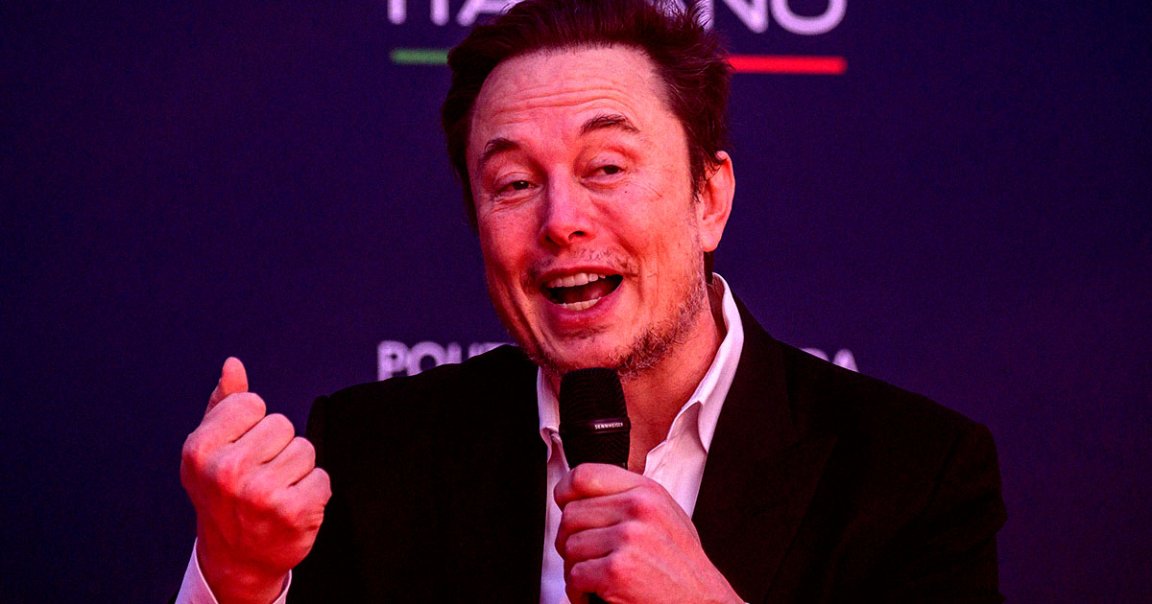
In a Monday tweet , Tesla CEO Elon Musk made a startling demand, claiming he was “uncomfortable” with building AI products and robots with Tesla without having a “25 percent voting control.”
“Enough to be influential, but not so much that I can’t be overturned,” he wrote.
If those demands aren’t met, Musk threatened to pursue other AI ventures “outside of Tesla.”
It’s a bizarre ultimatum that really dials up the pressure on investors. Musk also infamously sold off $22.9 billion of his own Tesla shares to fund his disastrous acquisition of Twitter.
Clawing back a 25 percent stake — an increase of 12 percent given his current standing — would amount to a massive rise in the net worth of the world’s richest man.
Predictably, investors are now crying foul, pointing out Musk already has plenty of power over the carmaker as it is.
“Now he seems to be blackmailing the Tesla shareholders, saying he won’t build stuff for us unless he gets another $30 billion,” Tesla investor Ross Gerber told CNBC this week. “Where in the world does paying a CEO $30 billion make any logical sense in the modern world, who already has a $150 billion stake in the company?”
Gerber also argued that Musk’s control over the EV maker was aided by his “friends” and family members, including his brother Kimbal Musk and close associates like James Murdoch, who was identified in 2022 as a possible successor as CEO.
“The idea that he doesn’t control Tesla when everybody on the board is a friend or family member of his, is the part I’m really pushing back on,” Gerber added. “He controls Tesla more than anybody controls any company. So the idea that he needs more stock to do this, it just seems weird to me.”
Other experts have pointed out Musk could be flaunting his role as a CEO.
“The problem is his tweets suggest that in his capacity now as CEO and director, he is not only turning down profitable Tesla opportunities based on his personal preferences, but also redirecting them to his private companies,” Tulane Law School professor Ann Lipton told Reuters. “That’s a conflict of interest that suggests a violation of his fiduciary duties to Tesla.”
So far, Musk has launched a separate company called xAI, which is looking to raise $1 billion from investors, and has pocketed almost $135 million from four investors, as of December.
As far as robots are concerned, Tesla has shown off several generations of its Optimus humanoid robot so far, which is designed to perform “tasks that are unsafe, repetitive or boring.”
Tesla is also working on so-called “Full Self-Driving” software that uses machine learning and neural networks and its in-house silicon called Dojo to drive autonomously, though it still requires human supervision.
Especially since his chaotic $44 billion acquisition of Twitter, his relationship with Tesla investors has been strained. The ill-fated buyout sent stocks of the EV maker plummeting, angering shareholders.
In short, Musk’s latest threat isn’t likely to sit well with them. Nonetheless, Tesla bulls argue Musk should be given a bigger stake given his influence.
“It’s no secret and a key to our bullish thesis that all AI initiatives be kept within Tesla from Dojo to Optimus to FSD to various robotaxi and other robotic developments,” Wedbush Securities analyst Dan Ives, longtime Musk supporter, wrote in a research note.
Ives believes the CEO’s antics will soon be water under the bridge.
“We believe the Board and Musk will be able to resolve this issue over the next 3-6 months and ultimately all AI initiatives will be kept within Tesla,” he added.
Meanwhile, Musk claims he has no beef with investors and said that the “Tesla board is great.”
But whether everybody agrees with that assessment is looking far less likely, given Gerber’s comments.
More on Tesla: Elon Musk Says Earth Will Soon Host a Billion Humanoid Robots